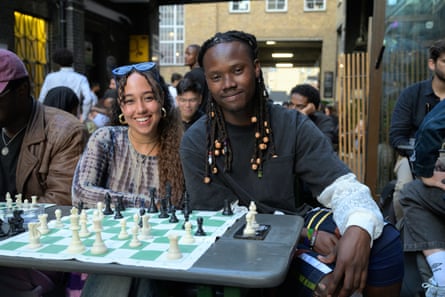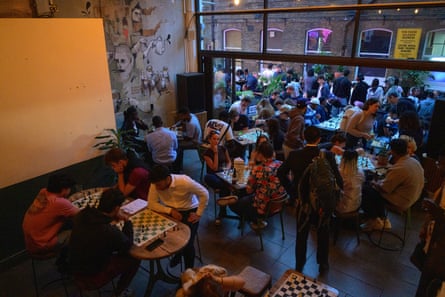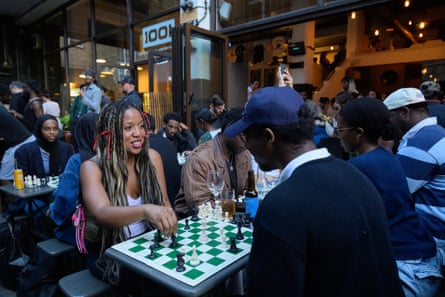One of the liveliest spots on a Tuesday night in east London’s Brick Lane isn’t a restaurant or a streetwear brand pop-up, it’s a chess club – or chess club-nightclub hybrid, to be exact.
Knight Club is the unlikely crossover between chess and London’s fervent nightlife scene. It was started by Yusuf Ntahilaja, 27, who began his first chess club in August 2023 at a smaller bar in Aldgate, not too far from the current location at Café 1001 on Brick Lane.
“I wanted to make chess clubs for people who look like me and people my age,” he said. “Typically, chess is only put in spaces that are full of older people, which isn’t diverse enough.”
On the first night, there were only eight boards between 16 people. Now, a “good night” at the weekly Knight Club will attract about 280 people.

At first glance, Knight Club feels more like a DJ event than a chess club. Cocktails are flowing and music is playing, but the chessboards on every table aren’t just ornamental or there as a gimmick: they are all occupied and surrounded by a queue of onlookers waiting for their turn.
Jimmy Ifenayi, 24, has been attending Knight Club regularly for the past four months. “I had no knowledge of chess before I came here, and the first time I ever played, I played a game against a grandmaster. It was a quick win, but it made me intrigued to learn and keep playing chess,” she said.
“The event is about 50% social and 50% people actually wanting to play chess … It’s a nice way to decompress, which doesn’t involve going to a club to see other people my age.”
In recent years, chess has been cemented in the cultural zeitgeist. The popularity of online chess proliferated during the pandemic, making it one of the fastest-growing internet games in the world. In popular culture, the Netflix series The Queen’s Gambit, as well as Sally Rooney’s recent novel Intermezzo, have created a certain iconography surrounding the game, which has drawn in a new generation of players.

But much of this newfound appeal of the chess club isn’t necessarily about the technicalities of the game; rather, it is the ease of social interaction that it facilitates, by pulling up a chair and playing with someone who may be a total stranger.
“It’s a great Trojan horse,” said Jonah Freud, co-founder of Reference Point in London, a bookstore, library, cafe and bar, which has hosted a popular chess club every Wednesday since it opened four years ago. Freud’s aim is to “take chess off a pedestal and make it feel like pool in a dive bar”.
“It’s a really easy vehicle to meet people. It kind of takes the weight of the necessity of conversation away from interacting with people. You can do the uncomfortable bit of introducing yourself and talking to someone over a board rather than with no kind of context around it.”
In Birmingham, Chesscafé is a regular chess night held at York’s Cafe, just outside the city centre. “We found that people are looking for spaces where you can go out, socialise and have a good time outside of going to a bar or club,” said its founder and organiser, Karan Singh, 21.
Alongside his friend Abdirahim Haji, 21, Singh bought chessboards, printed flyers and began the chess club in January, during his final year of university. In less than a year, Singh said Chesscafé has grown to attract more than 100 young players to its events.
“A chess club has a specific connotation to it, about it being quiet. We really try to go the opposite direction; it’s a social party with chess involved,” he said.
For many, chess clubs are an introduction to the game. Zoë Kezia, 27, is learning how to play chess with other attenders of chess night at Reference Point. Her interest in the game was piqued after an enjoyable night dancing and playing chess at one of Knight Club’s events.
“It’s a strange concept, but it works,” she said. “It encourages face-to-face interactions rather than screen-based activities. It’s a free third space to meet new people. It’s welcoming, you don’t have to necessarily be good at chess.”

Kezia jokingly likened the popularity of chess among young people to the facade of the “performative male”, an attempt to feign intellectualism while signalling the veneer of “coolness”. Whether the chess trend has fostered a genuine interest in the game isn’t something she’s quite convinced by. “It’s a wholesome trend, but it’s very much a trend,” she said. “When you’re playing against people who are really serious about it, it quickly becomes less enjoyable.”
It may all be a bit of fun and games for those looking to use a chessboard as a social vehicle, but serious players do have their place, albeit off the dancefloor.
Lucia Ene-Lesikar, 22, who helps organise Knight Club,says that more competitive attenders have formed a league table. “People who are in the league will play each other, we’ll go to quarter-finals, semi-finals, and then we’ll finally have a league winner.”
Ryames Chan, 23, is a competitive player and chess teacher. He has been in the league for about a year and plays at the club almost every week. “This is a nice alternative to playing serious chess; it gives a sense of community,” he said.
“It’s interesting to see how it becomes more of a social activity, because previously the only people who played chess were people who didn’t go outside; they just stayed home. It’s usually just two people playing on a chessboard …
“The thing I like about here is that you’re not actually facing the computer, you’re facing real people.”

.png) 3 months ago
79
3 months ago
79

















































